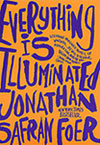
Everything Is Illuminated
By Jonathan Safran Foer
I was very close to my grandfather, who was from Ukraine, and his death raised a number of questions: What is a person of substance? I believe very much that he was a substantial man, but how did he become one? What does it mean to be of Eastern European descent? What does it mean to be Jewish?
I started working on a screenplay to explore some of my family history. Then Bill Buford, the former fiction editor at The New Yorker, asked me to read a piece called "The Very Rigid Search," by Jonathan [which would become part of this novel]. It's about a young American who goes to Ukraine to trace his family's history and is taken around by this Ukrainian kid, his grandfather, and the grandfather's dog. The parallel narrative is a whimsical chronology of the village where the American's ancestors once lived. Two images from the book have stuck with me: The first is of a wagon falling into a river and trinkets floating to the surface. I thought that was such a beautiful moment, and full of so many ideas about how things keep coming back in our lives, things that have been buried at the bottom of rivers, lakes, and ponds, how they have information and life and illumination in them. Then there is this other scene with a man who takes an orphan baby into his home. To keep her warm, he puts her in the oven in a roasting pan filled with newspaper—and when he takes her out, he reads the news off her naked body. It's such an extraordinary image, filled with such love and tenderness. I was very moved by that. I thought Jonathan's book was hilarious and wonderful—and that it had done all that I was trying to do but with such humor and compassion. I met him, and he agreed to give me the rights to the book. I wrote an adaptation of it and filmed it last year.
By Jonathan Safran Foer
I was very close to my grandfather, who was from Ukraine, and his death raised a number of questions: What is a person of substance? I believe very much that he was a substantial man, but how did he become one? What does it mean to be of Eastern European descent? What does it mean to be Jewish?
I started working on a screenplay to explore some of my family history. Then Bill Buford, the former fiction editor at The New Yorker, asked me to read a piece called "The Very Rigid Search," by Jonathan [which would become part of this novel]. It's about a young American who goes to Ukraine to trace his family's history and is taken around by this Ukrainian kid, his grandfather, and the grandfather's dog. The parallel narrative is a whimsical chronology of the village where the American's ancestors once lived. Two images from the book have stuck with me: The first is of a wagon falling into a river and trinkets floating to the surface. I thought that was such a beautiful moment, and full of so many ideas about how things keep coming back in our lives, things that have been buried at the bottom of rivers, lakes, and ponds, how they have information and life and illumination in them. Then there is this other scene with a man who takes an orphan baby into his home. To keep her warm, he puts her in the oven in a roasting pan filled with newspaper—and when he takes her out, he reads the news off her naked body. It's such an extraordinary image, filled with such love and tenderness. I was very moved by that. I thought Jonathan's book was hilarious and wonderful—and that it had done all that I was trying to do but with such humor and compassion. I met him, and he agreed to give me the rights to the book. I wrote an adaptation of it and filmed it last year.
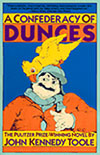
A Confederacy of Dunces
By John Kennedy Toole
I picked this up when I was 12 or 13. For some bizarre reason, I identified with Ignatius Reilly, this overweight medieval scholar who lives in New Orleans with his mother. The book is a comedy of errors and manners about a guy who just doesn't relate to the rest of the world. In one scene, his mother finally reads him the riot act about getting out of the house and getting a job, and he responds with a tirade. But through the rage, you see a real vulnerability, and you become aware of how his anger masks his complete awkwardness, his sense of alienation.
By John Kennedy Toole
I picked this up when I was 12 or 13. For some bizarre reason, I identified with Ignatius Reilly, this overweight medieval scholar who lives in New Orleans with his mother. The book is a comedy of errors and manners about a guy who just doesn't relate to the rest of the world. In one scene, his mother finally reads him the riot act about getting out of the house and getting a job, and he responds with a tirade. But through the rage, you see a real vulnerability, and you become aware of how his anger masks his complete awkwardness, his sense of alienation.
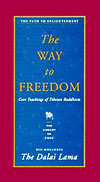
The Way to Freedom
By his holiness, the Dalai Lama of Tibet
This book, a primer on Tibetan philosophy and Buddhist teachings, addresses in a very straightforward way the elements of unhappiness. In the introduction, the Dalai Lama talks about the struggle between the negative and positive forces in our brains. I took from the book that we can work to eliminate the causes of our suffering. If, for instance, negative thoughts are preventing you from feeling happy, can you practice for 20 seconds a day not having a pessimistic thought? The minute you try, though, an onslaught of negativity runs into your brain. But I found it to be a very interesting exploration of how our minds work. You sit there for 20 seconds and go, Hmm, can I not have a negative thought? Of course, I can't—that guy yesterday did that f---ing thing. Then you realize how, through meditation, you can control those thoughts, and you can do it longer and longer.
By his holiness, the Dalai Lama of Tibet
This book, a primer on Tibetan philosophy and Buddhist teachings, addresses in a very straightforward way the elements of unhappiness. In the introduction, the Dalai Lama talks about the struggle between the negative and positive forces in our brains. I took from the book that we can work to eliminate the causes of our suffering. If, for instance, negative thoughts are preventing you from feeling happy, can you practice for 20 seconds a day not having a pessimistic thought? The minute you try, though, an onslaught of negativity runs into your brain. But I found it to be a very interesting exploration of how our minds work. You sit there for 20 seconds and go, Hmm, can I not have a negative thought? Of course, I can't—that guy yesterday did that f---ing thing. Then you realize how, through meditation, you can control those thoughts, and you can do it longer and longer.

Our Man in Havana
By Graham Greene
I'm beginning to see a pattern here that I didn't notice before: A lot of these books, including this one, center on neurotic, detached people who are forced in one way or another to deal with the world. This novel is about Jim Wormold, a quiet vacuum cleaner salesman who reluctantly becomes involved in the Cold War espionage game in pre-revolutionary Cuba. I've read it a few times—not only because it made me laugh out loud but because, even in its most satiric moments, it shows how fragile government is; how haywire, accidental, and ludicrous international policy can be; and how decisions that change millions of people's lives are often the result of terrible accidents.
By Graham Greene
I'm beginning to see a pattern here that I didn't notice before: A lot of these books, including this one, center on neurotic, detached people who are forced in one way or another to deal with the world. This novel is about Jim Wormold, a quiet vacuum cleaner salesman who reluctantly becomes involved in the Cold War espionage game in pre-revolutionary Cuba. I've read it a few times—not only because it made me laugh out loud but because, even in its most satiric moments, it shows how fragile government is; how haywire, accidental, and ludicrous international policy can be; and how decisions that change millions of people's lives are often the result of terrible accidents.
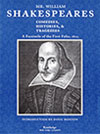
The Shakespeare First Folio
Edited by Doug Moston
I was separated from my father, an actor and a carpenter, when I was 4. We met again when I was 17. Our communications were strained and difficult. I was pursuing a theater education, studying as a playwright and an actor. I had been into Shakespeare since I was young, and he knew that. One day he sent me a copy of the First Folio, which for all intents and purposes is the authority on what Shakespeare actually wrote. It was a perfect gift from him: an acknowledgment of who I was, who he was, and who I was becoming. There's a great sense of tradition in the First Folio—the intimacy of it, the lettering (the f's that replace the s's), the knowledge that these texts were written for his actors. Being able to get that close to the text and its history was something that made me feel much closer to my father.
Edited by Doug Moston
I was separated from my father, an actor and a carpenter, when I was 4. We met again when I was 17. Our communications were strained and difficult. I was pursuing a theater education, studying as a playwright and an actor. I had been into Shakespeare since I was young, and he knew that. One day he sent me a copy of the First Folio, which for all intents and purposes is the authority on what Shakespeare actually wrote. It was a perfect gift from him: an acknowledgment of who I was, who he was, and who I was becoming. There's a great sense of tradition in the First Folio—the intimacy of it, the lettering (the f's that replace the s's), the knowledge that these texts were written for his actors. Being able to get that close to the text and its history was something that made me feel much closer to my father.
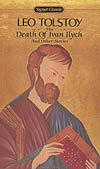
Death of Ivan Ilyich and Other Stories
By Leo Tolstoy
My mother named me after Tolstoy—in Ukraine he's called Lev Tolstoi—so I knew that eventually I'd have to read his work. I discovered this story about Ivan Ilyich, a midlevel Russian bureaucrat, when I was 16. It's about his inability to relate to his own family, anyone at work, or even himself. It's such an intelligent and compassionate exploration of a man's life. In middle age, Ilyich becomes physically ill and his body starts to deteriorate. What I love is that the stages of his death are a life in themselves. In recognizing death, in fact, Ilyich discovers a truth about life. Having been utterly disconnected from people, he finds a closeness with a peasant who sits with him unfailingly through his last nights. The comfort and understanding he finds in their simple exchanges—that was eye-opening. You come away from this story with an appreciation for how precious individual moments can be.
By Leo Tolstoy
My mother named me after Tolstoy—in Ukraine he's called Lev Tolstoi—so I knew that eventually I'd have to read his work. I discovered this story about Ivan Ilyich, a midlevel Russian bureaucrat, when I was 16. It's about his inability to relate to his own family, anyone at work, or even himself. It's such an intelligent and compassionate exploration of a man's life. In middle age, Ilyich becomes physically ill and his body starts to deteriorate. What I love is that the stages of his death are a life in themselves. In recognizing death, in fact, Ilyich discovers a truth about life. Having been utterly disconnected from people, he finds a closeness with a peasant who sits with him unfailingly through his last nights. The comfort and understanding he finds in their simple exchanges—that was eye-opening. You come away from this story with an appreciation for how precious individual moments can be.




